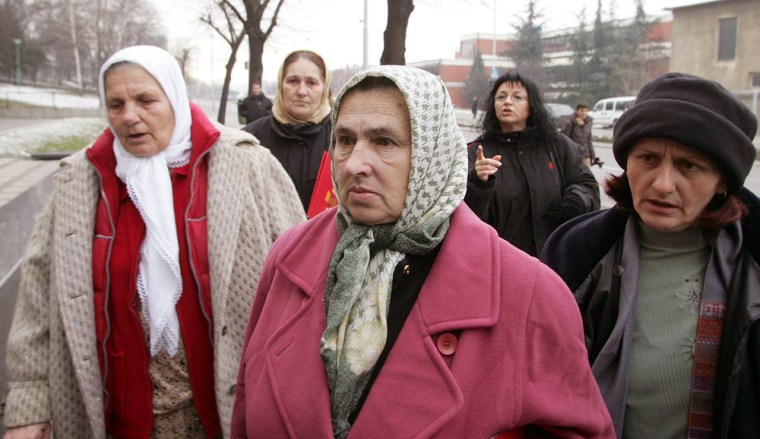The main suspect in a landmark trial of five Serb militiamen charged with the videotaped execution of six Bosnian Muslims said Tuesday he would have killed the soldier who filmed it if he knew it would become public.
The suspects, whose trial opened Tuesday in Belgrade, were charged after the June airing of the gruesome 1995 video showing six civilians being taken from a truck with their hands tied, lined up on a hillside near Srebrenica and sprayed with machine-gun fire.
The five face up to 40 years in jail if convicted. Serbia has abolished the death penalty.
None of the defendants entered a plea because it was not required by the Serbian judicial system. Instead, the judge immediately began questioning the accused, starting with main defendant Slobodan Medic.
No sign of remorse
Medic, the commander of the dreaded Serb "Scorpions" paramilitary unit, showed no remorse for the slayings during his opening remarks, saying that if he had known that the footage would become public, he would have "killed like a rabbit" the Serb soldier who did the filming.
As many as 8,000 Bosnian Muslim men and boys were killed when Bosnian Serb troops overran Srebrenica in 1995. It was Europe's worst mass killing since World War II.
Medic insisted he did not order the executions of civilians, but he added he could not control some of his soldiers, who were eager to kill rival Muslims after losing family members allegedly brutally slain by Bosnian Muslim fighters.
"I think I did everything the best I could, considering the circumstances," Medic said. "The footage is now in the center of attention but back then it was irrelevant. Now it can cost me my freedom."
The footage, first shown in June at the U.N. war crimes tribunal in The Hague, Netherlands, showed four Bosnian Muslim men being shot dead from behind. The two others were ordered to carry the bodies into a nearby barn where they, too, were killed.
"There is no death sentence, but I hope justice will be served for those monsters," said Sajma Saltic — whose brother Sadik, 36, was among the six executed.
The footage, which caused public outrage in Bosnia as well as in Serbia, was first shown at the U.N. tribunal's trial of former Yugoslav President Slobodan Milosevic, indicted for atrocities during the Bosnian and other Balkan wars.
The footage was considered by some legal experts strong evidence linking Milosevic to the Srebrenica killings.
Bid to call squad members rejected
However, The Hague tribunal last week denied war crimes prosecutors their request to call the members of the killing squad seen in the video. The tribunal said the footage was not considered important enough to reopen the prosecution part of Milosevic's trial.
Medic seemed very cautious not to implicate Milosevic or other Belgrade officials. He insisted that his unit was formed by rebel Serbs in neighboring Croatia, that it was based there and came to Bosnia merely "in response to appeals for help" from fellow Serbs in Bosnia at the time of crucial territorial battles there.
The indictment read out at the Belgrade court Tuesday said the Scorpions unit numbered about 500 men and fought on three occasions in Bosnia during the 1992-95 war there.
Defense lawyer Miroslav Perkovic expressed doubt about "the questionable and obviously edited video."
"Some segments appear authentic, but it is necessary to reassess its veracity," Perkovic said, adding that the broadcasting of the footage has "created a highly prejudiced atmosphere against the defendants."
Meanwhile, Serbian war crimes prosecutor Vladimir Vukcevic said the indictment may even be expanded to include more suspects. He did not elaborate but said "more evidence keeps coming in."
